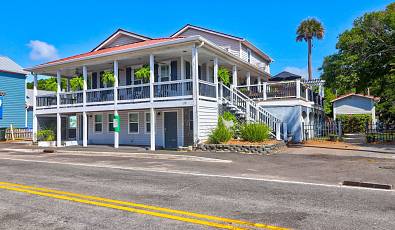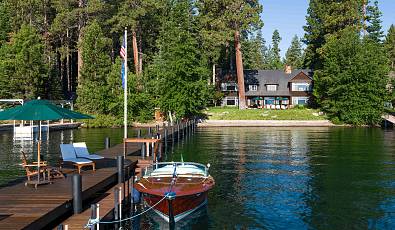Top Tips for Owning a Vacation Home
The dream of owning a second home is something many people seek to make a reality. But adding another property into the mix can come with a lofty set of responsibilities. If you want to make the most of your investment, but still reap the rewards of your own personal vacation spot, there are a number of things to consider.
1) Where in the world?
Perhaps the first question to ask yourself is where you’d like to vacation on a regular basis. Did you grow up going to a particular lake, beach, or mountain retreat where you’d like to foster more memories with a more permanent domain? Or perhaps you’ve found you keep coming back to a certain place that has captured a certain place in your heart, drawing you back when you find the urge to escape. If such a place exists for you, then you can cross general location off your list of places to search for your second home.

2) Digging Deeper
While it’s true you may have located the general area for your vacation home, you may want to scope the landscape for general living amenities. Do you like to cook on vacation? If so, are there ample shopping options like farmers markets for fresh produce and well appointed grocery stores for the ingredients you’ll want for cooking?
Not into cooking on your time off? Does the area you’ve chosen have a good selection of restaurants locally and in nearby towns? Don’t box yourself in if you know dining out is a key part of your vacationing enjoyment.
Beyond that it’s good to know if your vacation escape has good options for shopping, entertainment and recreational outlets like skiing, bike or boat rentals, or fishing outfitters.
3) Touristy or secluded?
Is the property you’re considering in a hot vacation market? Are there frequent visitors to the area throughout the year or just during seasonal times for winter skiing or summer beach combing? More importantly, do you want it to be? Often times, people enjoy the daily flourish of activity surrounding a certain vacation area. But others may prefer a more quiet, secluded environment. Before you make your investment, be sure you’re clear about what you really want during your vacation time. This way your expectations are set, and hopefully met, each time you visit.
4) Private or Shared?
If you’re looking for a second home in hotter real estate markets, you may want to consider using it as a rental property during times you’re not using it. It may be able to help supplement your mortgage with the rent income you receive from guests. These days there are plenty of rental management companies that help to do all the work for you, from online sites like HomeAway.com that manages the rental listing, to local companies that help clean and maintain the property when you’re not around.

5) Friends and Family?
Perhaps you opt to keep your second home off the rental market, are there friends or family members you’re considering sharing in the investment? Often times a family vacation home is something that brings people closer together, building lasting memories for holidays and special occasions. Not to mention the fact that sharing the responsibility can help offset financial constraints. But it’s always good to have a long discussion with friends or family members about expectations for how the home will be used and how time will be managed for individual visits. Will you allow other friends to use the home? Are there particular house rules you should put in place such as allowing pets or young children? As potentially awkward is it could be, make sure you have all details hammered out and reviewed by an attorney before entering into a financial obligation with someone else.
6) Consider the Living Space
When looking for just the right house, be mindful of the ideal layout you’d like to have. Do you plan to host large groups of people like family and friends? If so, you may want to consider an open plan that allows people to mix and mingle freely throughout the living space. It may also help to have a separate game or family room for younger ones to enjoy themselves when adults have the main area.
7) Keep a Pantry Inventory
You shouldn’t have to buy groceries every time you visit your home. At least not the shelf-stable basics like rice and beans. Keep a running inventory of necessities you have on hand and make a list of what you need to buy for your next visit before you leave. If there are other friends of family using the home while you’re away, make sure there’s an obvious place-such as a dry erase board on the refrigerator-for people to leave notes about needed items. Also be sure guests know what’s appropriate to use and not use when you’re not there.

8) A Well Stocked Kitchen
Cooking at a second home should be just as convenient as it is at your primary home. Not only should you have all of the common utensils, appliances and service-ware you’d need for a fully functional kitchen, but take stock of everything once a year to keep an eye on items that may have broken or have been lost from entertaining and hosting other friends and family.
9) Find Ways To Host More
Often times a vacation home becomes a place you want to share with many other friends and family, especially during holiday and popular vacation times. Be sure to maximize the amount of sleeping space you have. Invest in bunk beds and twin beds for younger guests. And pull-out couches can always be a good option for last minute sleepovers. But while it’s important to have a comfortable space for others to sleep, it’s also good to try to keep space for privacy in mind as well. Do you have plenty of bathrooms to open your doors to more people? Would adding a couple of outdoor showers help for bathing kids and post- pool or beach activity? Do you have plenty of towels and toilet paper on hand? The key to great vacation hosting is making sure you never come up short in making others comfortable.
10) Appealing Outdoor Living
Whether you’re opting for a beachside home or a mountain winter wonderland, don’t overlook the importance of outdoor entertaining. Whether hosting guests of your own or letting renters use the grill, it’s a good idea to make the outdoor area inviting and functional. Dining and seating areas are key as well as a well-defined outdoor cooking space. A patio hot tub, porch swings or hammocks are all great features for added outdoor pleasure.
- Topics:
- Travel
- Beach


